CMS asks: Is the future of the African Elephant at stake? 9th March 2012 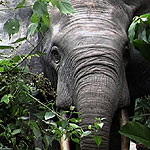 The recent accounts of poaching of close to 450 elephants in Bouba Ndjida National Park in northern Cameroon increase the concerns about the future of elephants in Africa. The CMS Secretariat has contacted the responsible Minister in Cameroon to express its deep concerns and requested more information on this incident. If the International Community fails to combat this kind of wildlife crime successfully, the future of the African Elephant will be at stake. The recent accounts of poaching of close to 450 elephants in Bouba Ndjida National Park in northern Cameroon increase the concerns about the future of elephants in Africa. The CMS Secretariat has contacted the responsible Minister in Cameroon to express its deep concerns and requested more information on this incident. If the International Community fails to combat this kind of wildlife crime successfully, the future of the African Elephant will be at stake.
During CMS’s 10th Conference of the Parties (November 2011) Cameroon, on behalf of the Central African CMS Parties once again reiterated that CMS progress a conservation initiative for Central African Elephants remained a key priority for the region. Cameroon and Congo confirmed their desire to proceed with a facilitated consultation between Central African Parties. Cameroon, supported by Congo, indicated they would be ready to take a leading role in this process.
read more Niger protects Sahelo-Saharan species in the new Termit Tin Toumma National Reserve8th March 2012 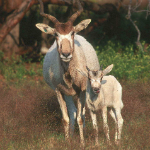 The Government of Niger has approved the creation of the Termit Tin Toumma National Nature and Cultural Reserve. This 'hotspot' for desert biodiversity and home of the last population of addax in the wild is one of the largest protected areas in Africa. The Government of Niger has approved the creation of the Termit Tin Toumma National Nature and Cultural Reserve. This 'hotspot' for desert biodiversity and home of the last population of addax in the wild is one of the largest protected areas in Africa.
The mountain range of Termit and the adjoining sands of Tin Toumma are located in the east of Niger and are considered today as a key area for Sahelo-Saharan biodiversity, including some very threatened species such as the addax, the dama gazelle and the Saharan cheetah, and some regionally important populations of Dorcas gazelle, Barbary sheep and Lappet-faced vulture.
read more Estonia’s newest Ramsar Site protects 2 million birds migrating over the Baltic Sea8th March 2012 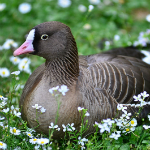 Estonia has designated its 17th Wetland of International Importance - Haapsalu-Noarootsi - a wetland complex situated on the northwestern coast along the Baltic Sea protecting an important wintering, staging, moulting and breeding site for 225 different bird species, including Long-tailed Duck Clangula hyemalis, Common Eider Somateria mollissima and globally threathened Lesser White-fronted Goose Anser erythropus. At least 20 percent of the water birds migrating over the Baltic Sea (up to 2 million individuals) pass through this site. Estonia has designated its 17th Wetland of International Importance - Haapsalu-Noarootsi - a wetland complex situated on the northwestern coast along the Baltic Sea protecting an important wintering, staging, moulting and breeding site for 225 different bird species, including Long-tailed Duck Clangula hyemalis, Common Eider Somateria mollissima and globally threathened Lesser White-fronted Goose Anser erythropus. At least 20 percent of the water birds migrating over the Baltic Sea (up to 2 million individuals) pass through this site.
read more Migratory Wildlife Network is now speaking in over 50 languages!5th March 2012 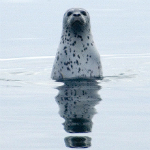 Our aim has always been to support wildlife experts around the world. While the Migratory Wildlife Network comprises a few staff we are proud of our global Membership and we have known since the beginning that language was going to be our first hurdle to cross. Our small team doesn’t have the budget to stretch for continuous translations, so thanks to the efforts of our brilliant web team, we are very pleased to announce today that the Migratory Wildlife Network's website is now fully multi-lingual! We know the translations won’t be perfect, but we are very pleased to be able reach more wildlife experts, in their native tongue, from all around the world. Wildlife knows no boundaries – and language should not be ours. Our aim has always been to support wildlife experts around the world. While the Migratory Wildlife Network comprises a few staff we are proud of our global Membership and we have known since the beginning that language was going to be our first hurdle to cross. Our small team doesn’t have the budget to stretch for continuous translations, so thanks to the efforts of our brilliant web team, we are very pleased to announce today that the Migratory Wildlife Network's website is now fully multi-lingual! We know the translations won’t be perfect, but we are very pleased to be able reach more wildlife experts, in their native tongue, from all around the world. Wildlife knows no boundaries – and language should not be ours.
read more France designates two new Ramsar Sites in the Aquitaine Region4th March 2012 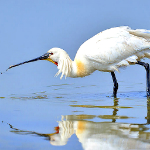 The Government of France has designated two new Ramsar Sites: the Marais d'Orx in the Basque county; and the Leyre river delta sector of the Bassin d'Arcachon tidal bay. Together the sites provide protection for the Eurasian Spoonbill (Platalea leucorodia), Bluethroat Luscinia svecica namnetum, European Eel (Anguilla anguilla) and European Mink (Mustela lutreola) as well as a large number of insect, amphibian, reptile, fish and mammal species. The Government of France has designated two new Ramsar Sites: the Marais d'Orx in the Basque county; and the Leyre river delta sector of the Bassin d'Arcachon tidal bay. Together the sites provide protection for the Eurasian Spoonbill (Platalea leucorodia), Bluethroat Luscinia svecica namnetum, European Eel (Anguilla anguilla) and European Mink (Mustela lutreola) as well as a large number of insect, amphibian, reptile, fish and mammal species.
read more International experts recommend Public Trust Doctrine for Rio+20 discussions29th February 2012 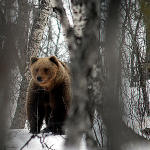 Setting humanity on a sustainable course will require striking a balance between the use of natural resources and their conservation. An ancient but often overlooked doctrine called the Public Trust Doctrine (PTD) provides a legal foundation and implementation framework for achieving sustainable resource use. Setting humanity on a sustainable course will require striking a balance between the use of natural resources and their conservation. An ancient but often overlooked doctrine called the Public Trust Doctrine (PTD) provides a legal foundation and implementation framework for achieving sustainable resource use.
Two key topics at Rio+20 in particular could be clarified by applying the PTD: protecting the rights of future generations to functioning ecosystems and the governance of ecosystems and resources beyond national jurisdiction.
A group of International experts recommend that the notion of the 'Public Trust' be incorporated into the conversations regarding institutional frameworks for sustainable development at Rio+20.
read more CITES expresses grave concern over elephant killings in Cameroon29th February 2012 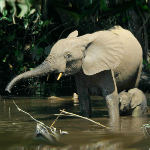 The Secretary-General of the Convention on International Trade in Endangered Species of Wild Fauna and Flora (CITES), John E. Scanlon, has expressed grave concern over recent reports of the poaching of close to 450 elephants in Bouba Ndjida National Park in northern Cameroon. The Secretary-General of the Convention on International Trade in Endangered Species of Wild Fauna and Flora (CITES), John E. Scanlon, has expressed grave concern over recent reports of the poaching of close to 450 elephants in Bouba Ndjida National Park in northern Cameroon.
Governments of the region are being offered support to find, and bring to justice, the criminals responsible and to locate and seize the poached ivory. Potential transit and final destination countries have also been urged to remain extremely vigilant and to cooperate.
read more |











